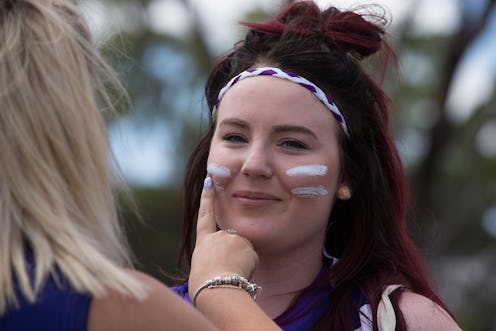Fashion
Drinkable Sunscreen Is A Thing
Summer is almost here, but you know what that means! As soon as we've finally uncovered our winter-pasty skin to greet the warm sun, we've got to cover it all up again with icky, gloppy, greasy sunscreen lotions. Skincare companies roll out new products every summer, but this year brings something really different: a Colorado-based brand, Osmosis Skincare, has introduced a "drinkable sunscreen," allegedly offering SPF 30 protection. The product, called Harmonised H2O UV, should be ingested with 2 ml (with 2 oz. of water) every four hours. After ingesting, "the product's liquid molecules vibrate on the skin, canceling out 97 percent of UVA and UVB rays," allegedly.
My father once had melanoma (a deadly, hereditary kind of skin cancer) so I take special care in the sun. This especially means avoiding time outside during peak sun hours and wearing sunscreen regularly. Unfortunately, along with my dad's melanoma genes, I also inherited his finicky skin: basically every sunscreen I've ever used has stung, clogged my pores, and/or caused breakouts on many and various parts of my body.
So, I was optimistic to hear about the drinkable sunscreen. Anything would be better than feeling like a piña colada-scented lump of shortening melting in the sun, right?
Not so fast, this stuff is probably too good to be true: the product has got red flags all over it.
- Not endorsed by any dermatological organizations. There are testimonials on the company's own website, but obviously these aren't worth as much as an assessment by, or endorsement from, independent dermatologists. Although the company's founder is a physician, that's unfortunately no guarantee of the medical legitimacy of its products.
- Claims to work via "frequencies that have been imprinted on water." Vibrating water is a hallmark of pseudoscientific, homeopathic quackery. No credible evidence has ever been produced to demonstrate that water made to vibrate continues to have any therapeutic properties later. Though vibration products may have some helpful placebo effect for things like relaxation or sleep, there's no apparent mechanism by which your beliefs in a sunscreen's skin-protective qualities would actually make it protect your skin.
- "Enhanced Tanning" version available. Now, it's true that "sun care" displays often include tan-enhancing products like tanning oil. But these do not ordinarily claim also to be protecting your skin from the sun. A tan is essentially mild skin damage, and sun tanning produces color via exposure to UV rays which also do damage to your DNA. So, it doesn't make sense to claim that a sun product "blocks UV" while still allowing for a maximum tan.
Don't waste any of your precious time, money, or skin health on drinkable sunscreen just yet. I'm keeping my greasy, pale fingers crossed for a scientifically-valid product in the future, though!
